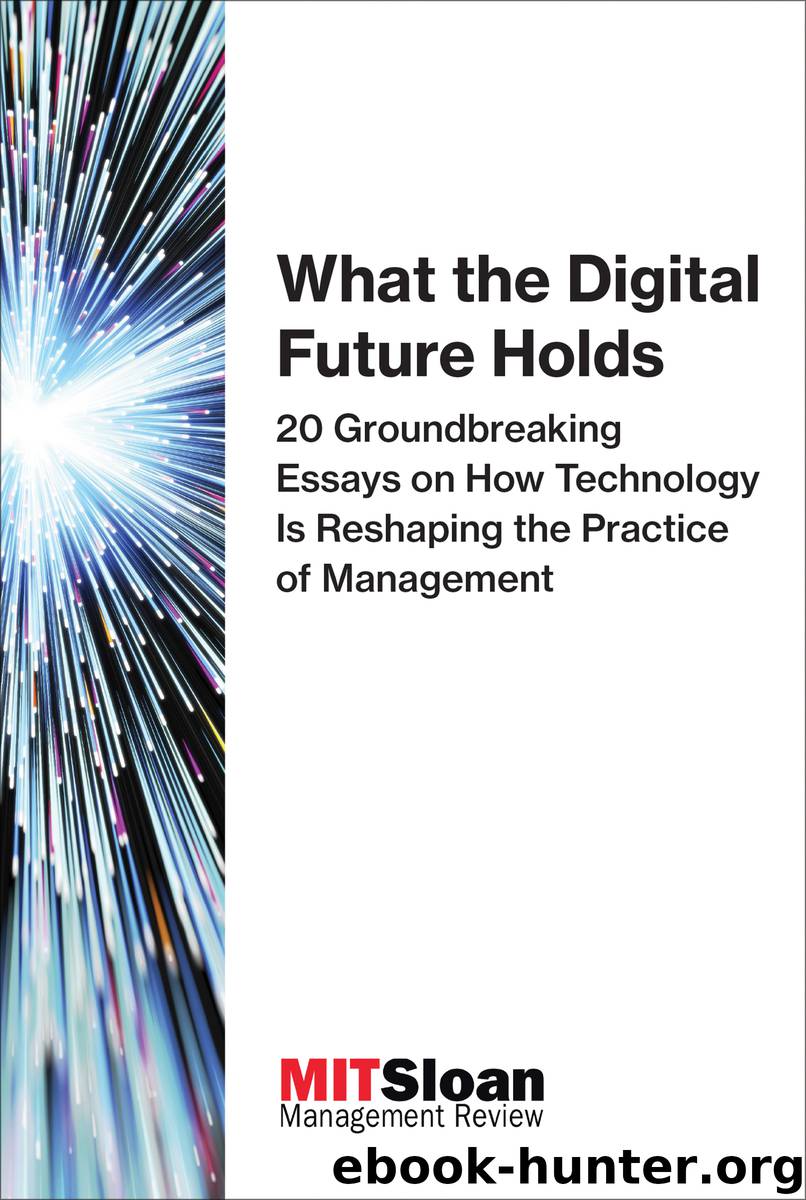What the Digital Future Holds by MIT Sloan Management Review

Author:MIT Sloan Management Review
Language: eng
Format: epub
Publisher: The MIT Press
Published: 2018-02-09T05:00:00+00:00
10
The End of Corporate Culture as We Know It
Paul Michelman
We are evolving toward an age of networked enterprises, in which the traditional hierarchies of the corporation will be supplanted by self-organizing systems collaborating on digital platforms.
It will be the era of entrepreneurship, distributed leadership, and the continual reorganization of people and resources. It will be the time of disintermediation both within and between organizations. Layers of management will fall; the need for centralized systems and trusted go-betweens will dissipate, if not disappear.
Or so many experts predict.
As for me? Yes, I do believe this is the future toward which we are slowly advancing. Those of us deeper into our careers may not see it come to full fruition during our organizational lives, but the trends are real, and they are already on display if you care to look for them.
And that makes me genuinely worried for my friends in the corporate-culture business. Because I’m not sure that culture is going to matter all that much in the future—at least not in the ways we conceive of it today.
Jon Katzenbach, one of the field’s most respected and creative thinkers, defines an organization’s culture as “the self-sustaining pattern of behavior that determines how things are done.” It is “made of instinctive, repetitive habits and emotional responses.” Culture is meant to provide a well-rooted sense of purpose within an organization, exemplified by a recognized set of behaviors and shared beliefs. It gets—and keeps—everyone marching in the same direction.
Creating and maintaining culture is, thus, painstaking work. It demands focus and commitment throughout organizations. During my work life, I have been lifted by strong corporate cultures and nearly drowned by weak ones. I have no doubt of culture’s power to align an organization and enliven its workforce. And there are plenty of studies to back that up.
But that’s history speaking.
As to life in the digital matrix, there is reason to question culture’s role. Our relationships to institutions will become increasingly defined by the activity in which we are engaged at any given time. We will come to view ourselves as “affiliates” more than “employees” as we think of that term today. We will encounter new partners and colleagues on a rolling basis. We will weave in and out of relationships and flow across broad platforms of commerce in individual and small-group nodes, working interchangeably with people who belong to the same organization and those who do not.
In this world, we will no longer prize alignment; we will prize realignment.
Such an environment benefits from clear and universal rules of engagement. It does not benefit from habits that are distinctive to one group of people—which is the essence of organizational culture.
In his 1966 book, The Will to Manage, the celebrated father of management consulting Marvin Bower described a company’s philosophy as “the way we do things around here.” Those words helped to establish the role of corporate culture and to solidify its purpose over the next 50 years. But we are embarking upon a time when the “way we do things” will be reinvented with each new collaboration on the network.
Download
This site does not store any files on its server. We only index and link to content provided by other sites. Please contact the content providers to delete copyright contents if any and email us, we'll remove relevant links or contents immediately.
Learning SQL by Alan Beaulieu(6276)
Weapons of Math Destruction by Cathy O'Neil(6261)
Digital Minimalism by Cal Newport;(5747)
iGen by Jean M. Twenge(5407)
Sapiens by Yuval Noah Harari(5363)
The Age of Surveillance Capitalism by Shoshana Zuboff(4274)
Elon Musk by Ashlee Vance(4119)
Thing Explainer by Randall Munroe(3930)
Apollo 8 by Jeffrey Kluger(3701)
Future Crimes by Marc Goodman(3591)
The Science Book (Big Ideas Simply Explained) by DK(3276)
The Innovators: How a Group of Hackers, Geniuses, and Geeks Created the Digital Revolution by Walter Isaacson(3136)
Who Can You Trust? by Rachel Botsman(3129)
I Live in the Future & Here's How It Works by Nick Bilton(2990)
Infinite Energy Technologies by Finley Eversole(2972)
Steve Jobs by Walter Isaacson(2888)
Dawn of the New Everything by Jaron Lanier(2764)
Chernobyl by Serhii Plokhy(2534)
Ben Franklin's Almanac by Candace Fleming(2520)
